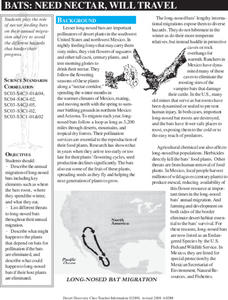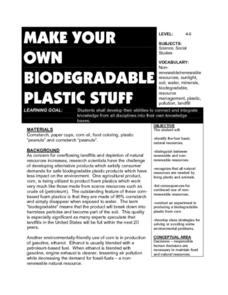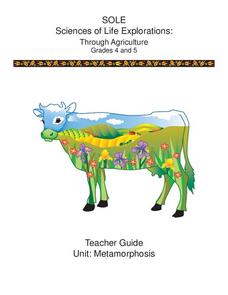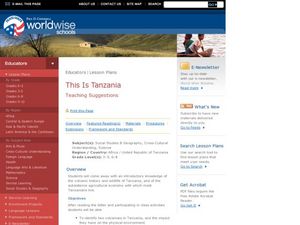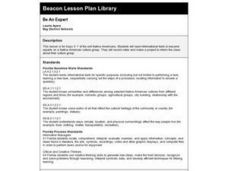Curated OER
Bats: Need Nectar, Will Travel
Beginning wildlife biologists become adult bats, baby bats, snakes, owls, bobcats, or land-clearing developers in a grand role-playing activity. In a large open space, they play a game in which they move to designated areas based on what...
Curated OER
The Risks of Everyday Living
Students compare their perceptions of risk to the perceptions of scientists and risk professionals. in small groups, they evaluate risks on a scale of 1 to 10 for the average American on a yearly basis.
Agriculture in the Classroom
Build it Better
If you think you can do better, feel free to give it a try. Pupils learn about the work on Temple Grandin and consider ways to improve animal handling facilities. They work in groups to build models to showcase their ideas.
Curated OER
Examining What Sharing Really Means
Learners read "The Senegalese Miracle". They discuss the amount of sharing the author finds in Africa. They examine the relationship the author has to the locals.
California Academy of Science
Pollution in Our Watershed
The concept of a how pesticides and other chemicals pass through a watershed can be difficult for younger learners to grasp without a concrete example. In the activity here, some blank paper, markers, and a spray bottle are all you need...
Curated OER
Resources and Economic Development
Identify natural resources in the world and how they translate into economic development. In this global economy lesson, your class will utilize the Internet to view an Oregon Time Web which they research to examine the history of...
Wild BC
Is Climate Change Good for Us?
Is it really that big of a deal if the global climate undergoes a little change? Young environmentalists consider this very question as they discuss in small groups the impact of different climate change scenarios on their lives,...
Curated OER
Make Your Own Biodegradable Plastic Stuff
Young scholars identify the four basic natural resources. They distinguish bettween renewable and non-renewable resources. Pupils recognize that all natural resources are needed by living plants and animals. Students list consequences...
Curated OER
Telling Our Own Stories
Explore online profiles and social media with your middle and high school classes. Use blogs to inspire your class to craft a well-written, thoughtful response to a prompt you give. A few example prompts are given.
Agriculture in the Classroom
Understanding the Columbian Exchange Through Old World and New World Foods
If you're interested in teaching your class about the impact of the Columbian Exchange on contemporary society, this is worth a look. The plan begins with an introduction to the topic, which stems from a cell phone poll...
Curated OER
Bird Brilliance!
First graders explore natural resources and search outdoors to find materials to create a bird's nest. In this bird's natural resources lesson, 1st graders listen to a book about birds and reflect on the various things birds use to...
Rural Science Education Program
Bees and Flowers – Partners in Pollination
Why are bees so important? After several activities where kids investigate the form and function of flowers, they learn about the different types of bees and label them. They then examine pollen under a microscope and decide which bees...
Cornell University
Metamorphosis
Looking for an insect unit that addresses multiple skill strategies? Young entomologists explore multiple life cycles of insects that go through metamorphosis. The brainteasers and mobile activity spark learner interest before guiding...
Library of Congress
Industrial Revolution
Could you live without your phone? What about cars, steel, or clothing? Class groups collaborate to produce presentations that argue that either the telephone, the gramophone, the automobile, the textile industry, or the steel...
Channel Islands Film
Island Rotation: Lesson Plan 2
Why are Torrey pines only found in La Jolla, California and on Santa Rosa Island? Class members examine images of Torrey pines from these two locations, noting the similarities and differences, and then develop a demonstration model that...
Curated OER
This Is Tanzania
Students explore Tanzania. In this geography skills lesson, students read This is Tanzania by Richard Lupinsky, Jr. and discuss the impact that volcanoes have had on the nation. Students analyze the imagery in Lupinsky's piece and create...
Curated OER
The Water Cycle
Your class sets up a mini water cycle model to examine the process. Then they watch an animation, following a water molecule through the cycle. A well-developed lab sheet guides learners through the lesson and a PowerPoint presentation...
Curated OER
Farmers - Caretakers of the Land
Young scholars explore resource management, specifically farming. After reviewing vocabulary words, groups of students explore what is conserved by each practice. They compare and contrast responses. Young scholars describe farming...
Curated OER
Good Food Explorers
Students use different food items in order to practice the mathematical concept of shape recognition. At the same time the teacher explains how crops are a source of physical health. They use all five senses to describe each food item...
Curated OER
Examining What Sharing Really Means
After reading "The Senegalese Miracle" about the degree of sharing the author encounters upon arrival in Africa, class members read Mike Tidwell’s “Sharing in Africa” and compare the two stories. This cultural diversity lesson concludes...
Curated OER
Defining Drought
Students examine the hydrologic impacts of drought. Humans can change the course of the water cycle, to some extent, to meet their needs, but can they do so without imposing risks on the plants and animals?
Curated OER
Manduca
Pupils investigate the basic survival needs of both hornworms and humans. They compare and contrast the them by making a class list.
Curated OER
Be An Expert
Part of a series of lessons about bring Native American stories into the classroom, this plan suggests having kids research and take notes on one group of Native Americans and then complete a project that they present to the class. Pull...
Curated OER
Three Gorges Dam: Will China Sink or Swim?
Seventh graders study the Three Gorges Dam, which is the largest dam built in the world. They examine how the dam impacts China as it prepares for the 21st century.
